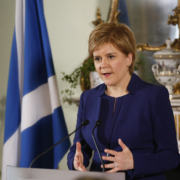After Montenegro voted for independence, constitutional divisions just got worse. A warning for Scotland? – The Scotsman
With that in mind, it is worth reflecting on the experiences of a European country that gained their own independence following a referendum held exactly 15 years ago.
On 21 May 2006, the small Adriatic country of Montenegro held a referendum to determine whether its citizens wished for it to embark upon an independent path or remain in union with Serbia.
Of course, there are few direct parallels between Scotland and Montenegro, a country in the Western Balkans of just 622,000 citizens.
Scotland faces entirely different challenges in a dissimilar context, yet there are lessons to be drawn from Montenegro’s experience, not least how pre-existing divisions within a body politic can become entrenched by the zero-sum game of a referendum and the resulting resentments can weaken the foundations of a newly independent country.
Montenegro’s path to independence was far from straightforward and complicated further by the question of whether Montenegrins were a separate nation or part of the wider Serbian nation.
Montenegro’s citizens, and often families, were divided on the issue. An independent state between 1878 and 1918, Montenegro was absorbed into the Kingdom of Serbs, Croats and Slovenes (later, the Kingdom of Yugoslavia) before becoming one of six republics within the Socialist Federal Republic of Yugoslavia.
With the violent disintegration of Yugoslavia in the early 1990s, Montenegro united with Serbia, albeit as a junior partner within the rather asymmetric Federal Republic of Yugoslavia.
In 1997, Montenegro’s prime minister, Milo Djukanović, fell out with his erstwhile sponsor, the Serbian president, Slobodan Milošević and Montenegro’s monolithic Democratic Party of Socialists (DPS) split into a pro-Milošević faction led by the Montenegrin president, Momir Bulatović, and an anti-Milošević faction led by Djukanović, who began to slowly create greater distance between Montenegro and Serbia.
This led to the crystallisation of two large political blocs, pro-independence and pro-union, and the trajectory towards an independence referendum.
Though there was much speculation that a referendum would be held in 2002, the pro-independence Montenegrin government signed the Belgrade Agreement, which ensured the continuity of the union with Serbia.
Djukanović, however, extracted a key concession – that a referendum on Montenegro’s independence could be held three years after the ratification of the agreement. That referendum took place on 21 May 2006.
In advance of the referendum, I attended numerous pro-independence and pro-union rallies in different parts of the country. It was evident that the momentum was with the pro-independence bloc, led by the DPS.
The European Union played a key role in the referendum, monitoring it closely and insisting not on a simple majority but upon 55 per cent of the overall vote as the threshold for victory.
It was a controversial measure but, in a deeply divided society, a prudent one. In the referendum, 55.5 per cent voted for independence, 44.5 against. The result left a significant minority embittered by the outcome of a referendum they had not wanted.
Nevertheless, following the declaration of independence in June 2006, Montenegro rapidly joined key international organisations and adopted an unambiguous Euro-Atlantic foreign policy orientation, with EU and Nato membership central to it.
Foreign investment increased and the tourism sector in the ‘Monaco of the Balkans’ boomed. Domestically, however, the DPS dominated. The argument, made by pro-independence campaigners in 2006, that independence would lead to the power of the DPS diminishing, proved hopelessly optimistic.
Instead, they became a ‘state party’, the winners of the referendum and the self-proclaimed guardians of Montenegrin statehood and national identity.
They consolidated their power – though they had to rely on coalitions to govern – the lines between party and state became increasingly opaque and the system of patronage that developed became impenetrable to those without party connections. The opposition remained weak, divided and unable to effectively challenge the DPS.
Allegedly Russian-backed coup attempt
During the ten-year anniversary of independence, however, I was struck by how muted the celebrations were. Although there was a genuine sense of pride among many that the first decade of independence had been a success, it had increasingly come to be viewed as a ‘DPS project’ and Montenegro a ‘private state’ controlled by a small, powerful elite.
Those opposition politicians who opposed Montenegro’s accession to Nato were angered that the government were taking Montenegro into the Western military alliance against their will.
That perception did much to undermine the DPS, despite the fact that the October 2016 parliamentary election – during which an allegedly Russian-backed coup d’etat that aimed to derail Montenegro’s Nato membership was foiled – was won narrowly by the DPS and their allies. Less than a year later, Montenegro joined Nato.
It was, ultimately, an ill-judged attempt by the government to push through a new ‘Law on Religious Freedoms’ in 2019 that facilitated a political union between the Serbian Orthodox Church in Montenegro and the opposition.
Large protests against the law were a precursor to the country’s first change of government through the mechanism of democratic elections in August 2020.
The new government, with a majority of one seat in parliament, comprises numerous MPs that opposed independence and Nato membership, have close links to Serbia and Russia, and Serb nationalists who claim that Montenegro is part of the ‘Serbian World’.
Meanwhile, the once all-powerful DPS, now in opposition, argues that the country is under attack from Serbia, Russia and by a pro-Serbian/Russian government that negates a separate Montenegrin national identity, wishes to destroy Montenegro’s statehood and reverse the country’s Euro-Atlantic orientation.
Fifteen years after the referendum, therefore, divisions not only remain but are more acute than they were during the 2006 referendum. Independence, while it has brought significant benefits, was not a panacea and has done little to resolve pre-existing disputes.







